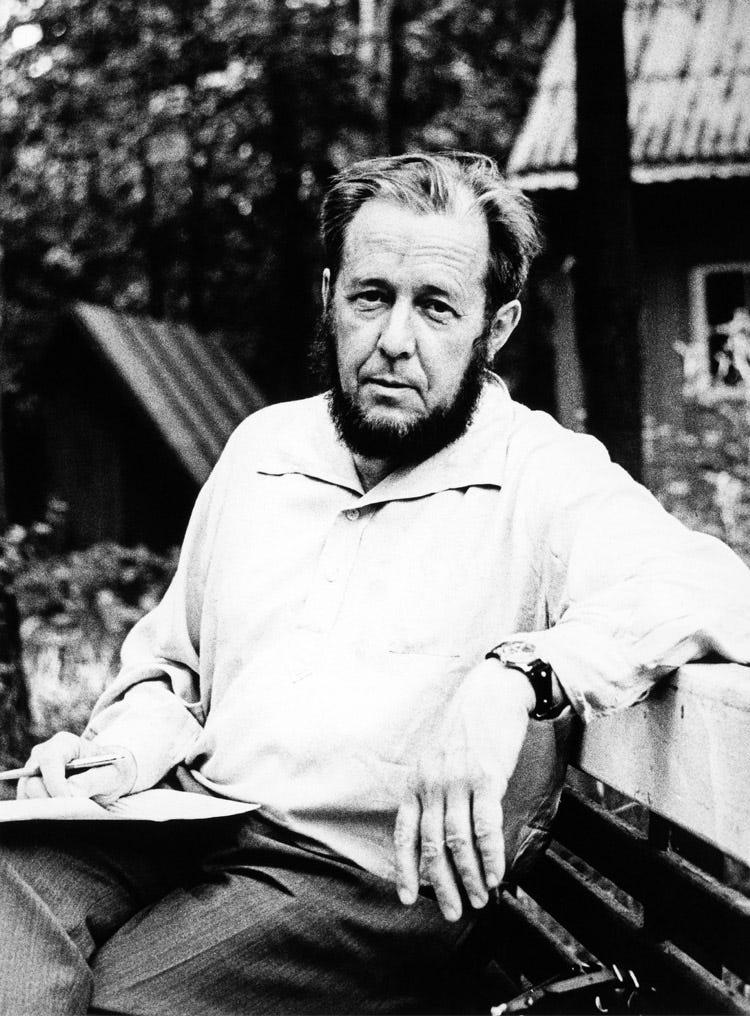“One Death is a Tragedy but a Million is a Statistic” - Joseph Vissarionovich Stalin
How many children and young adults have to be mutilated before this stops?
Fifty years ago, Aleksandr Solzhenitsyn's masterwork The Gulag Archipelago was published and read in English for the first time. Aleksandr Isayevich Solzhenitsyn was a Russian author and Soviet dissident who helped to raise global awareness of political repression in the Soviet Union.
This autobiographical work was pivotal in shattering the lingering sentimental attachment to communism and the USSR. In countries like France, where it was always fashionable to be a Marxist, this book irrecoverably altered the course of intellectual lives and in the USA, it halted the new left’s celebration of the disciples of Marx, including Stalin, Lenin, Castro and Mao.
It may be difficult for people in the present day to realize just how well Soviet propaganda worked and how many people who were not living there considered to be smart, clever and big thinkers were used to spread the myths of the “paradise” of the Soviet Union. Solzhenitsyn's firsthand accounts of life there, including detailed and accurate word pictures of life in the gulags (prison work camps) spared no one’s sensitivities with his graphic, but accurate tales of freezing, starving and being worked to death, right down to the smaller indignities that are in place when the guards feel as punished as the prisoners do and no one feels as though they have anything left to lose.
One of the key points in this work is Solzhenitsyn's revelation that he had to learn to separate true and implanted beliefs. In other words, did he believe something because he had been conditioned to believe it, or because he had given it a due amount of thought and truly embraced it as a valid thought?
How do we recognize beliefs that are truly our own?
This is a question I find myself asking, not just of those who believe that somehow their bodies are all “wrong” and need fixing, but of those who from the relative safety of their own acceptable bodies seem hell bent on supporting practices that cause harms to others.
When as a society, did we trade honesty for deception and truth for falsehoods? At what point in history did we decide that parental mental angst was a good enough reason to allow adults to strip away from children, their right to grow into an optimized adulthood?
Humans are social animals, which is why solitary confinement is considered a form of torture. Broadly speaking, we only function at our best when we work together, and we are designed to live collaborative lives. It is considered to be a terrible fate to be cast out of any societal circles, be these our families, our workplaces or desired social events. We are a tribal species, although in today’s world tribal does not only mean a small, geographical grouping, as our tribe can center around an interest or hobby, or a particular identity. This is also a reason why cults work so well as they tap into our desire to belong. I have written about cults here:
Finding meaning in life is paramount
Those who were held in the Nazi concentration camps in WWII and survived that horrendous experience had something in common with the prisoners of the Soviet gulags. They found a reason to live. Account after account demonstrates this and psychiatrist and psychotherapist, Viktor Frankl, a Holocaust survivor who existed for three years in four concentration camps and survived while his parents, siblings and wife all died while imprisoned, built his post war career around this concept.
Frankl believed that many illnesses and mental health issues are disguised negative feelings arising from the experience of human freedom and responsibility and that people struggle with a lack of meaning. After the war ended, he dedicated his life to helping others find their meaningful purpose.
Can you find yourself in an illusion?

For me, one of the main take home messages from Kathleen Stock’s book Material Girls, was her assertion that the transgendered life is a performance art lifestyle. The curtain never falls, the audience is never released to go home and get on with other things and the performance literally never ends.
Not only does this mean that the entire point of a trans life is overwhelmingly self-centered, but it also means that that one’s very being is at the mercy of the opinions of others. I mean, if you lose your audience, do you cease to exist at all?
Stock also posits that this is why the trans population has vested so much into anger, because it’s one thing to have your small circle of family and friends succumb to the confused belief that you can choose to identify as someone you are not, but when you go out into the world and the applause stops, it’s so easy to just get really furious at the “injustice” of having to continually “prove” who you “really” are. Why can’t people just agree that you can be a pregnant “man” or that a man with a functioning penis deserves to be considered a lesbian because he “feels” like one?
I suspect that most of us raised in enormous privilege of our Western/Global North value system would struggle to survive in either Nazi concentration camps or the Soviet gulags, but those of us who have spent our lives working within a framework of our embodied and very real concrete and literal lives might have a shot at making it through.
Those who have vested everything in artifice that they claim proves their “authenticity” haven’t got a chance.
Finding your own meaning by connecting with others
Frankl believed that there are three paths to discovering your own meaning and all of them require you to remove the focus from yourself and aim your perspective towards others, which helps you to feel whole, while at the same time spending less time feeling preoccupied with your own problems and worries.
Simply put, Frankl’s three paths to finding your meaning are:
§ Performing a deed or creating something–taking action.
§ Coming into contact with someone or experiencing something.
§ Experiencing unavoidable suffering, and the attitude we take toward this.

Solzhenitsyn also discovered that “the meaning of life lies not, as we have grown used to thinking, in prospering, but in the development of the soul.” Recognizing he would not have discovered that meaning without suffering, he disagrees with all those writers who “considered it their duty . . . to curse prison. . . . I nourished my soul there, and I say without hesitation: ‘Bless you prison, for having been in my life!’”
Is transgenderism a form of unavoidable suffering?
Standing on the outside, I would argue that coming out as transgendered is entirely avoidable, but when I listen to detransitioners, I’m not so sure. For those so heavily invested in their gender/sexual identity, it might appear that trying this out for size and ultimately rejecting it, was a necessary part of their individual journeys to wholeness.
But no one of us lives in a vacuum and the influence of powerful and trusted adults in the lives of children is a major factor in the trans decision. Offering young children a choice that can never be realized is an example of adult narcissism, not good parenting. It takes many years before children comprehend the real differences between our two mammalian sexes and lying to children about what this means causes them harms that they may never be able to escape from. Especially once they have moved beyond social transitioning and have irrevocably altered their bodies through taking hormones and/or having surgery that permanently removed healthy body parts.
This mother was so determined to do everything “right” by her son that she was left plagued with guilt about the harm she had caused him by treating him as a sort of an ‘equal friend’ when she abdicated her responsibility of taking on a parental role. Children need the loving guidance of their parents to optimize their brain development and are not equipped to do their own parenting for themselves. Without the secure boundaries that parents are meant to supply, children are pushed into survival mode, which leaves them too mentally busy to get on with the other tasks they should be engaging in such as formal learning and building healthy relationships with others.
Finding life’s meaning in reality
A theme that runs through nearly all of Solzhenitsyn's work is how, even in the depths of evil we can practice discernment and choose the good.
Rather than telling those who are confused about a supposed mismatch between their physical bodies and whatever one chooses to call the equivalent of a gendered soul, wouldn't they (and we) be better served by being supported to come to terms with truth and reality? Your reflection in a mirror, be this made of glass or the thoughts of others, is not reality. The only reality we ever have is ourselves, in the body we were born in.





Kathleen Stock was right on the nail about ‘transgenderism’ being a non-stop performance. It must be exhausting for those constantly exposed to it, and forced to participate in it.
Lucy, this is a thought provoking article and you draw important parallels with other social movements that turned out to be destructive. Could our youth possibly benefit from seeing their own bodies as inadequate? This doctrine seems to me to be about propagating self-hatred.